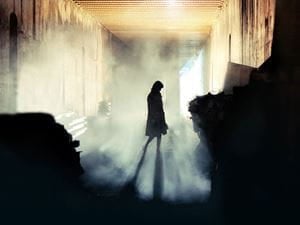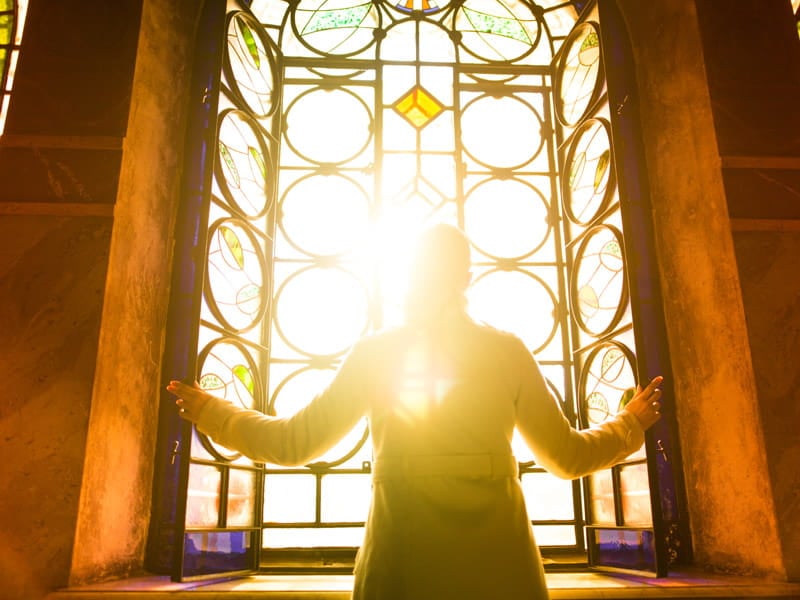
We are closer to accepting death more than ever today. There are movies, books and studies on the subject to keep it on the forefront of our minds. Due to this, deathbed visions and crossing over to the other side is not a story of folklore. The idea is maturing and becoming widely affirmed as a probability. We're no longer dismissing accounts of people undergoing the same experiences in regards to the afterlife. There are incidences we simply can't explain away. You might see a loved in your mind's eye, smell their perfume, have dreams, feel their presence or feel their touch. A loved one who passed will try to get your attention to let you know that they are okay. Communicating with those who have passed is as easy or as hard as you make it. Release all preconceived notions, clear your mind, and be open to receiving a message from beyond.
The last weeks of life.
People have extraordinary dreams or visions in the final weeks of their lives. Researchers from Canisius College in New York released their findings which included following 66 patients receiving end-of-life care at the Center for Hospice and Palliative Care in Cheektowaga, New York. The researchers interviewed patients daily about the content, frequency and comfort level of their end-of-life dreams and visions (ELDV). Participants talked about people visiting them who were dead. This was the first study to survey patients in the last weeks of life. “As participants approached death, comforting dreams/visions of the deceased became more prevalent,” the researchers wrote. “The impact of pre-death experiences on dying individuals and their loved ones can be profoundly meaningful. "These visions can occur months, weeks, days or hours before death and typically lessen fear of dying, making transition from life to death easier for those experiencing them,” the study found. Researchers at Daemen College and at Hospice Buffalo, an agency of the Center for Hospice & Palliative Care, studied 63 patients and found the same results. Patients reported dreams of not meeting all their goals in life and revisited "Life experiences, such as war, childhood abuse, or difficult situations or relationships." They bring about a sense of peace, a change in perspective or an acceptance of death, suggesting that medical professionals should recognize dreams and visions as a positive part of the dying process,” according to Scientific American.
Deathbed visions.
Researchers also of the same study found the most common visions of those on the verge of death were of deceased relatives, friends, pets and religious figures. They found people experiencing at least a vision before passing. Almost half of the visions occurred while asleep, and nearly all patients indicated that they felt genuine. They also reported participants felt more fulfilled than those of the living, living and deceased combined, and other people and experiences. As participants approached death, comforting visions of the departed became more prevalent. They also felt a consistent sense of realism and marked emotional significance. "These dreams and visions may be a profound source of potential meaning and comfort for the dying, and therefore warrant clinical attention and further research." We don’t know just how many people have deathbed visions since only about 10 percent of dying people are conscious shortly before their deaths. But it is estimated between 50 to 60 percent of them experience certain revelations.
Deathbed visits.
The dying are often visited by their mothers. "It shouldn't be too surprising that the person who is actually present as we cross the threshold of life and take our first breaths once again appears at the threshold as we take our last breaths," wrote David Kessler, the author of The Needs of the Dying. He also shared about a dying patient named Roberta. She whispered her mother's name in the hospital room. Her daughter said she couldn't see anyone, but her mother replied: “Of course you can’t see her—she’s here for me, not you!” He spoke of another woman who was dying and she shared her father died but she saw him sitting on the bed. Crystal McVea was clinically dead for 9 minutes when she battled pancreatitis. When she woke up, she saw 2 angels welcoming her into an astonishing presence and a blinding light and she also saw loved ones. "What we don't have proof of is whether they represent some proof of the afterlife or where they can be explained in some other way. We don't know exactly what their causes are. There are other things that could explain this phenomenon." said author and paranormal investigator Leslie Kean.
What happens when we die?
Medium Concetta Bertoldi in her book, Do Dead People Watch You Shower?, answered one of the most intriguing questions the living have. And that is what really happens to us when we die? She said nothing at all is forgotten and when we depart, we enter a light she explained to Today.com. There's a review of our lives and we will observe all the hurt, pain and happiness we've inflicted on other people. "We see and understand the whole domino effect of all our actions and of every interaction we had with anyone," she added. Those who have passed don't have a voice box and use speaking to the mind as another way to communicate, psychic medium and teacher Amanda Linette Meder shared. "It’s much more common, to hear the voice of your guides, angels and loved ones – come from within," she explained. Our loved ones reveal their presence by sending us scents that are associated with then and even now. Kean said she experienced objects moving in her kitchen and electronics going haywire for no reason. This usually happened after she meditated and asked for something to be shown to her. "Then there was an apparition that appeared, which I did not ask for and did not appreciate it because it happened in the dark," she added. Acknowledging the personal significance of end-of-life experiences may help people transition more into a peaceful state. This is vital for those dying and for loved ones.
Most people believe in the afterlife.
Most people in the scientific community who conclude there's proof of the afterlife will not attest to it on the record. This doesn't change the mind of the nearly 1-in-5 U.S. adults (18 percent) who allege they’ve seen or been in the presence of a ghost, according to Pew Research Center. Fewer people believe in God, but an increasing number of people believe in life beyond the earth. About 80 percent of Americans said they believe in an afterlife in 2014, up from 73 percent in 1972-1974. Additionally, people describe a close encounter with God during an experience with death. Those having these experiences come from all walks of life, including practitioners, investigators and ordinary people from all around the world. "There are cases of blind people, who have been declared clinically dead, who lived again and left their bodies, who saw the light for the first time in their lives. Researchers recommend that you ask a question like "Where are you?" You can also turn feel a change in temperature. Another variation is feeling physical pressure. You may feel a tingling, a burning, or a numbing sensation as well. More people are discovering that the conscious does live on after death.
Signs of an encounter.
There are many accounts of people feeling disconnected from reality when they sense the presence of a loved one who passed. If you suddenly feel comforted it could be a deceased one protecting you particularly during troublesome circumstances. If you’ve been going through a bad time, and feel a sense of order for no real reason, someone is safeguarding you. Dreams are a common way for people to interact with you as well. When we sleep, we're more open to uniting with people on the other side. Additionally, they may manipulate appliances, lights, radios and turn on other electric gadgets without a power source. Also, there will be old and hot spots and your pets will pick up on activity. Dogs may bark excessively at something that we, humans, cannot see or sense at the time. Pets will most likely move away from the area where paranormal activity is occurring. You may feel something brush up against you or quickly touch your skin. Spirits can arrive in various forms and may be limited to a specific space. "Physical sensations on your body such as tingling, the hairs on your skin rising up, or feeling a breeze when there was none, can all be signs of a departed loved one contacting you," Power of Positivity reported.
What does science say about the afterlife?
What happens when a dying person is trapped between worlds? These are called Near-Death-Experiences (NDE) and there could be an excess of carbon dioxide in the blood causing hallucinations of seeing Heaven and dead loved ones. Perhaps it's a cardiac arrest triggering a Rapid Eye Movement (REM) intrusion in people who have experienced NDE's. Some experts believe this can be explained away in further neurological terms. Dr. Joel Frader, director of the pediatric palliative care team at Lurie Children's Hospital told the Chicago Tribune "There are some fairly characteristic changes in brain chemistry that people have documented as death occurs, whether it's lack of oxygen or high levels of carbon dioxide or changes in nutrition getting to the brain."
The medical profession discounts the metaphysical experiences of the dying, blaming pain medication for the reasons people have certain experiences. But many doctors never spend enough time with patients to look at the bigger picture or to hear their stories.
The human mind can't understand spiritual things. Earth is only a temporary place for us but life doesn't have to end here. There are supernatural things we will never be qualified to solve and maybe we shouldn't and take at face value because we should cheapen a person's experience whether science backs up our experience or not. It's sort of like faith, we can't always explain why we believe, we just do. We can read according to Peter that we may die in the flesh, but we shall live in the spirit because Christ died for the just for the unjust. "So that He might bring us to God, having been put to death in the flesh, but made alive in the spirit." There are no staircases, white gowns or people playing harps on fluffy white clouds when we die, but we're on the verge of discovering something far more greater than ourselves after this life. In the meantime, we're all being watched and observed.

